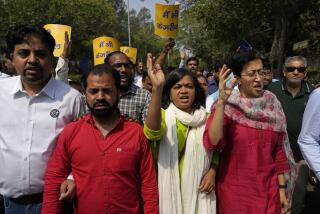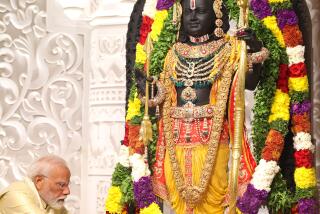Indian activist ends hunger strike with glass of coconut water
A septuagenarian anticorruption activist ended a 13-day hunger strike Sunday with a glass of coconut water after India’s Parliament bowed to his demands, agreeing to create a powerful, independent lokpal, or ombudsman, with authority to go after high-level corruption.
Whether or not the new agency has teeth or ultimately does much to stem endemic corruption remains to be seen. What is clear, however, is that activist Anna Hazare (“Anna” is an honorific title meaning elder brother) has rattled the political establishment by tapping a wellspring of public frustration over graft in ordinary life.
“I have only suspended my agitation,” he told cheering supporters. “I will not rest until all the changes that I look to are achieved.”
Hazare, wary that lawmakers might backtrack — a lokpal has been under discussion for four decades while a significant number of lawmakers stand accused of crimes including murder and extortion — had sought a binding commitment from Parliament that it would authorize the ombudsman’s position. Ultimately, however, he settled for a less restrictive “sense of the house” resolution that members passed by a thumping of their desks.
The squat activist also gained a pledge that state governments would introduce lokpals and that government agencies would write “citizen’s charters” detailing what services they provided and how long these should take. Bureaucrats often use threatened delays to exact bribes for things as varied as marriage licenses and land transfers.
Although India has seen several huge corruption scandals in recent months allegedly involving billions of dollars, many citizens appear most fed up with petty corruption. There’s plenty of blame to go around, however, with Hazare urging citizens to stop paying bribes as well.
Supporters consider him a hero for taking on the establishment, but a growing chorus of critics has questioned his tactics. Some have termed his use of huge crowds to bypass normal parliamentary procedure a form of blackmail, arguing that his approach is heavy-handed and undermines the spirit of democracy.
The end of the hunger strike underscored the media skills that Hazare and his “Team Anna” advisors have displayed throughout the two-week standoff. The coconut water and honey he downed on national TV was fed to him by two children, one a Muslim, the other a dalit, or so-called untouchable, to suggest the broad-based nature of his movement.
He delayed eating by more than 12 hours after the deal was struck, which helped maximize media coverage. And throughout the standoff, his team has used Twitter, Facebook and other social networking sites to increase public interest and spur media coverage.
Before he left Delhi’s Ramlila park, the site of his public fast, for hospital observation, he thanked Parliament and Prime Minister Manmohan Singh for helping to break the impasse, and outlined his next reform targets. These include improved electoral and education systems and better conditions for farmers and laborers.
More to Read
Start your day right
Sign up for Essential California for news, features and recommendations from the L.A. Times and beyond in your inbox six days a week.
You may occasionally receive promotional content from the Los Angeles Times.






